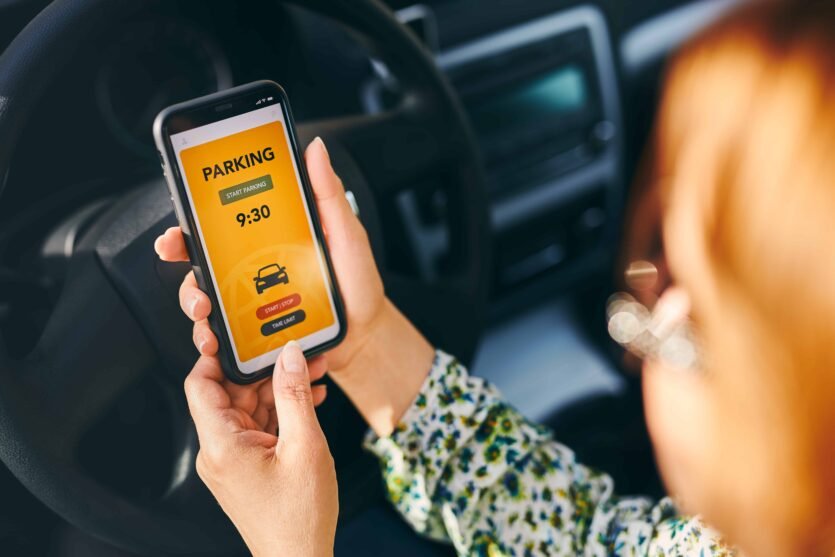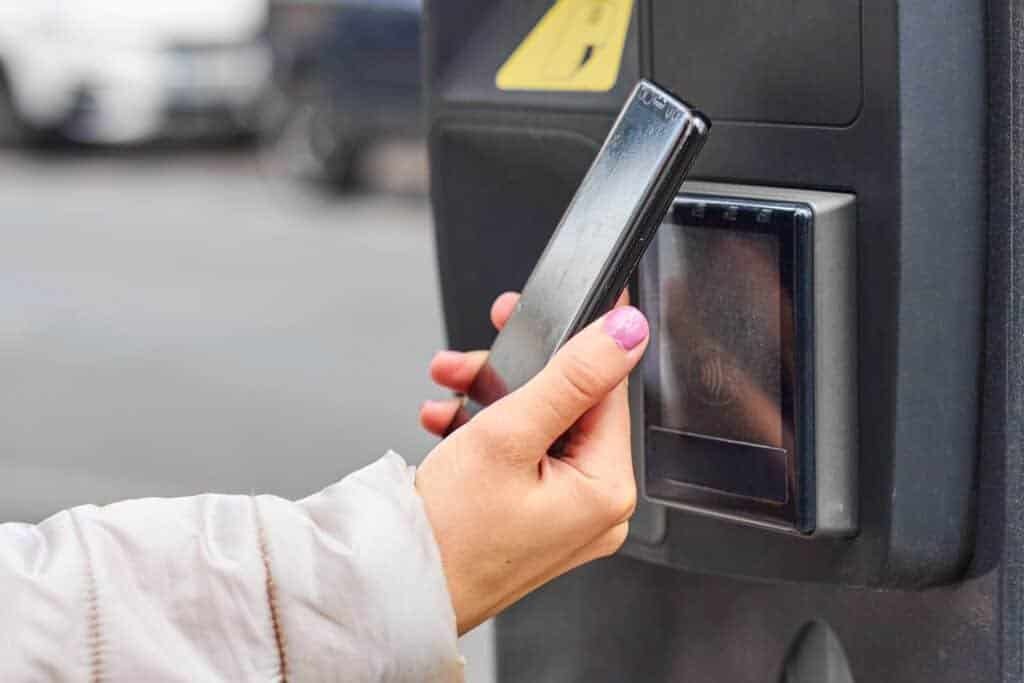Parking App Scams : Protect yourself from the growing threat

We may earn a small fee from the companies mentioned in this post.
With the rise of technology and convenience, the best parking apps have become a popular choice for drivers to find and pay for parking spots. However, scammers have taken advantage of this trend, creating a new wave of parking app scams that could cost unwary drivers dearly. How can one avoid falling victim to these fraudulent schemes? This blog post will delve into the growing threat of parking app scams and provide valuable insights on how to protect yourself from falling prey to these predatory practices.
Throughout this informative piece, we will discuss the various types of parking app scams, how to identify and avoid them, steps to take when reporting scams, and advice on recovering from a parking app scam. By the end, you will be well-equipped with the knowledge to safeguard your personal information and financial well-being from these malicious scammers.
Key Takeaways – Parking App Scams
Types of Parking App Scams
Fake Promotions: Scammers create bogus offers enticing drivers to enter personal and payment information on fraudulent websites
QR Code** Fraud:** Counterfeit QR codes placed in parking areas direct victims to malicious sites, tricking them into making payments or divulging sensitive data
Impersonation of Legitimate Apps: Fraudulent websites and apps mimic reputable parking services, leading to unauthorised charges and data theft. Falling for these scams can lead to unexpected parking fines and other financial penalties.
Preventive Measures
Verify Official Sources: Always download parking apps from official app stores and verify the authenticity of promotional materials
Inspect QR Codes: Before scanning a QR code, ensure it hasn’t been tampered with or placed over an existing code. Legitimate QR codes are usually integrated into the parking infrastructure and not added on top
Be Skeptical of Unsolicited Offers: Treat unexpected promotions and discounts with caution, especially if they require immediate action or payment information
Secure Your Information: Regularly monitor your bank statements for unauthorised transactions, change passwords frequently, and enable two-factor authentication on sensitive accounts
What to Do If You Fall Victim to a Scam
Report Immediately: Contact your bank to report fraudulent transactions and consider changing your bank details if necessary
Report to Authorities: Notify Action Fraud (0300 123 2040) or Police Scotland (101) about the scam. You can also report scam emails to report@phishing.gov.uk and text messages to 7726
Raise Awareness: Share your experience to help warn others about the scam and prevent further victims
The Rise of Parking App Scams

In recent years, there has been a significant increase in new parking app scam tactics targeting unsuspecting drivers. These scams come in various forms, such as fake promotions, misleading advertisements, and QR code fraud, all designed to deceive and trick victims into setting up recurring payments or paying fake platforms.
Many drivers prefer contactless card payments over using parking apps due to concerns about online fraud. Victims may suffer considerable financial losses, highlighting the importance of vigilance and up-to-date knowledge on the latest scam tactics.
Typically, these scams begin when drivers search for popular parking apps like JustPark, Parkonomy, PayByPhone, or Ringgo on their mobile phones, either on the Apple App Store or Android Play Store or visit them.
Scammers prey on drivers’ trust in these legitimate apps by creating counterfeit versions or hijacking promotions to lure victims into their schemes. The end result is often the theft of personal and financial information, and the victim unwittingly signing up for costly subscriptions or payments to fraudulent websites.
Fake Promotions and Misleading Adverts
Scammers use various methods to direct drivers to fraudulent websites, such advertisements posing as justpark, placing QR codes in parking lots or creating fake websites that appear at the top of search engine results, often using digital advertisements. Deceptive advertisements on these websites give the impression of endorsing genuine parking applications, convincing drivers to subscribe to expensive services or provide their personal information to fake platforms.
Many drivers preferred using contactless card payments or cash over parking apps due to concerns about online fraud and the complexity of the apps.
For example, a driver was directed to a fake website, called ‘Alltainment’ and, believing it was part of the parking app, entered their bank details. They were shocked to find out they had been subscribed to an entertainment package that cost £39.99 per month. Fortunately, they cancelled the subscription right away. In another case, a company called Automation Programs Solutions Ltd charged a £1.25 ‘profile setup fee’ and an additional £46.75 per month if the user did not cancel after a one-day trial. It’s essential to be cautious when providing contact details online, especially when dealing with unfamiliar websites or apps.
Falling for these fake promotions can result in significant financial losses to the victim.
QR Code Fraud at Car Parks
QR code fraud is a growing concern, as counterfeit or malicious QR codes are used to deceive or defraud individuals. In parking lots, scammers place these fraudulent QR codes to direct users to fake websites, such as the Alltainment website, potentially costing victims hundreds of pounds. UK customers, in particular, are targeted by these scams, putting their personal information and finances at risk.
Many drivers, especially the elderly, prefer using a parking meter over digital payment methods due to concerns about reliability and ease of use.
Preventing QR code fraud at car parks requires:
Using only trusted parking applications
Inspecting for signs of deception
Abstaining from entering personal information or payment details into untrusted websites or applications
By staying vigilant and informed, you can avoid becoming a victim to these scams and safeguard your financial security.
Checkout our informative article on protecting yourself from online scams
Identifying and Avoiding Scam Parking Apps

Avoiding parking app scams requires the ability to identify a legitimate parking app, such as JustPark, and exercising caution when dealing with unofficial app stores and their promotional materials and digital only. Being able to distinguish between legitimate and fraudulent apps can save you from potential financial losses and protect your personal information.
Drivers often need to download and register different mobile apps depending on their location, leading to a complex and cumbersome experience.
Checking if the application displays the official logo or verifying its presence in the respective App store, helps indiviguals steer clear of scam advertisements promoting fake parking Apps. Additionally visit the Apple App only, be mindful of counterfeit promotions and digital advertisements posing as genuine parking App promotions when using unofficial App stores.
Staying informed and cautious when utilising promotional materials and digital advertisements can also help prevent falling for fake parking App promotions and QR code fraud at car parks.
Official JustPark App vs. Scam Apps
The official JustPark App and website can be distinguished from scam Apps by checking for verified information, such as the App’s presence in the App store, official logo, and legitimate payment methods. JustPark has confirmed that there is no relationship between the official JustPark App and the Alltainment website, a fraudulent site associated with parking App scams.
When searching for the official JustPark App and website, be cautious of fraudulent websites that appear at the top of search engine results, such as ‘uk.apkpac.com’, which uses digital advertisements to appear at the top of search engine results. By researching credible sources and confirming accepted payment methods, you can ensure that you are utilising the official JustPark App and protecting yourself from scams. The establishment of a National Parking Platform aims to simplify parking payments by consolidating various payment methods into a single system.
Unofficial App Stores and Promotional Materials
Unofficial app stores are alternative app stores that are not sanctioned by the operating system’s app store. These stores provide apps that may not be available on the official app store and may include modified or tweaked versions of apps. Downloading applications from unofficial app stores may pose a risk, as the applications may contain malicious code or be fraudulent, and may not be updated regularly, leaving users exposed to security threats. Users are often required to download different mobile apps depending on their location for parking payments, leading to a complex and frustrating experience.
To prevent downloading apps from unofficial app stores, users should follow these steps:
Ensure that you are only downloading apps from reliable sources.
Read reviews and examine the app’s permissions before downloading.
Be cautious and vigilant when downloading apps and utilizing promotional materials to protect yourself from potential scams and safeguard your personal information.
Reporting Parking App Scams

Reporting parking App scams is a vital measure that not only protects you but also shields other potential victims from these fraudulent schemes. By contacting relevant advertising platforms, the Advertising Standards Authority (ASA), and reporting lost money to Action Fraud, you can help track down scammers and prevent future scams from occurring.
When reporting a parking app scam, follow these steps:
Gather relevant information, such as the name of the App, any communication or transactions associated with it, and any evidence available, including reported scam adverts.
Report the scam to the platform in which the app is advertised.
Report the scam to the Advertising Standards Authority (ASA) if the advertisement is found to be misleading.
Contacting Relevant Advertising Platforms
Contacting advertising platforms and the ASA can help remove scam adverts and protect other users from falling victim to these scams. The Advertising Standards Authority (ASA) is responsible for overseeing and regulating advertisements by legitimate businesses. It provides authorised platforms with key details of reported scam advertisements to help them take the necessary action.
Should you suspect an advertisement of being fraudulent, promptly notify the relevant platform and the ASA. By taking action and reporting suspicious advertisements, you can contribute to the fight against parking app scams and help safeguard others from falling victim to these deceptive practices.
Reporting Lost Money and Scam Attempts
Reporting lost money and scam attempts to authorities like Action Fraud can aid in tracking down scammers and preventing future scams. After reporting the scam, the authorities will conduct an investigation and implement measures to identify the perpetrators and avert future scams.
If you have received scam emails or scam text messages, forward them to Action Fraud for further investigation. By reporting lost money report scams and scam attempts, you are not only helping yourself, but also contributing to the protection of others who may be targeted by these malicious scammers.
Check out our informative blog on the 7 types of cyber security threats
Recovering from a Parking App Scam

Although recovering from a parking App scam might seem overwhelming, certain steps can help you secure your personal information and reestablish your financial stability. Here are some actions you can take.
Contact your bank to report the scam and protect your accounts.
Change your passwords for all online accounts to prevent further unauthorised access.
Report the scam to relevant authorities, such as Action Fraud and your local police force.
Elderly motorists are particularly vulnerable to parking app scams and may need additional support to recover from these incidents.
By taking these proactive measures, you can protect yourself and prevent future scams from affecting your life.
In the aftermath of a scam, it is important to:
Maintain a record of the associated events, including any reported scam adverts or other evidence
Rebuild your financial security
Stay vigilant against potential scams in the future
Taking these steps can help you protect yourself and prevent future scams.
Securing Personal Information
Should you suspect being a victim of a parking App scam, immediately reach out to your bank to relay the situation and provide pertinent information, like the bank account number where your money was sent. Taking this crucial step can help you recover your funds and protect customers safety and your personal information from further exploitation.
Additionally, it is essential to periodically change your passwords and enable two-factor authentication to safeguard your personal information. By staying vigilant and proactive in protecting your personal information, you can minimise the impact of parking app scams on your life and finances.
Monitoring Accounts for Fraudulent Activity
Regularly checking your accounts for fraudulent activity helps identify any unauthorized transactions and enables you to address the issue promptly. By consistently reviewing your financial accounts and implementing alerts for suspicious activity, you can protect yourself from further scams and take control of your financial well-being.
If suspicious activity is detected, flag it for further review and contact your bank or credit card company to report the fraud and take the necessary steps. By being proactive in monitoring your accounts and taking action when necessary, you can stay ahead of scammers and protect your finances.
Summary
In conclusion, the growing threat of parking App scams is a cause for concern, but by staying informed and vigilant, you can protect yourself from falling victim to these malicious schemes. From understanding the various types of scams and how to identify and avoid them, to reporting scams and recovering from their impact, this blog post has provided valuable insights that can empower you to safeguard your personal information and financial well-being. Parking apps offer convenience and efficiency for managing parking payments directly from smartphones.
As technology continues to evolve, so will the tactics of scammers. Stay vigilant, trust only legitimate parking apps and trusted sources, and remember that knowledge is power in the fight against parking app scams. Together, we can outsmart the scammers and protect our hard-earned money.
Frequently Asked Questions
How do QR code scams work?
QR code scams operate by exploiting the convenience and ubiquity of QR codes in our daily lives. These scams trick individuals into scanning a QR code that, instead of leading to a legitimate website or application, redirects them to a fraudulent site or initiates the download of malicious software.
How does a parking QR code work?
A parking QR code works by streamlining the parking process, offering a contactless and efficient way for drivers to access and pay for parking spaces via a smartphone and its camera function. However the automatic (smartphone camera to website) process can direct you to a bogus parking website that can scam victims into disclosing credit / debit card details.
Is ParkMobile app safe?
The recent cybersecurity attack on ParkMobile has made using the App for payment potentially unsafe. It is advised that current users immediately change their passwords.
Is PayByPhone a scam?
PayByPhone is a secure platform with the highest level of security for processing payments, which is PCI Level 1 compliant and all cardholder data is heavily encrypted. To avoid any scams, it is recommended to download the PayByPhone app directly from the App Store or Google Play Store.
Is RingGo parking a scam?
It appears RingGo parking is not a scam, however there have been reports of fraudulent websites pretending to be official RingGo webpages. Be sure to double-check that the webpage you’re using is indeed authentic before providing payment details.
What are some popular parking apps that scammers commonly use to initiate the scam?
Scammers commonly use popular parking apps like JustPark, Parkonomy, PayByPhone, and Ringgo to initiate their scams. Many parking apps are available, but drivers often express dissatisfaction due to the complexity and preference for traditional payment methods.
How do scammers direct drivers to fraudulent websites?
Scammers often direct drivers to fraudulent websites by placing QR codes in parking lots, creating fake websites, and using digital advertisements to make fraudulent websites appear at the top of search engine results. These tactics are designed to deceive unsuspecting drivers and lead them to websites that are not legitimate. The scammers can then collect personal information or charge for services that are not provided. It is important to be aware of these tactics and to take steps to protect yourself from these tactics. Finding a parking space efficiently is crucial, and scammers exploit this need by creating fraudulent websites that appear to offer convenient solutions.
External Reference Websites
Action Fraud
Website: actionfraud.police.uk
Description: Action Fraud is the UK’s national reporting center for fraud and cybercrime. They provide information on various types of scams, including those related to parking apps.
The AA
Website: theaa.com
Description: The AA, while primarily known for its breakdown service, also provides advice on parking, driving, and potential scams related to these areas.
Which? Consumer Rights
Website: which.co.uk/consumer-rights
Description: Which? offers consumer advice and has sections dedicated to scams, including those related to parking apps. They provide tips on how to avoid them and what rights you have if you’ve been scammed.
The RAC
Website: rac.co.uk
Description: The RAC, similar to The AA, provides advice on driving, parking, and potential scams. They often publish articles and advice on how to recognize and avoid parking app scams.
With over three decades of experience in the heart of London’s financial sector, I have dedicated my career to the pursuit of robust cybersecurity practices and IT leadership. As a Certified Information Systems Security Professional (CISSP), Certified Information Security Manager (CISM), Certified Chief Information Security Officer (C|CISO), Certified Ethical Hacker (CEH), and Computer Hacking Forensic Investigator (CHFI), I bring a wealth of knowledge and expertise to the table.
My journey in the field of cybersecurity has not only been about personal growth but also about sharing my insights with others. As an international speaker, I have had the privilege of addressing audiences worldwide, discussing the importance of cybersecurity in today’s digital age. My passion for knowledge sharing extends to my work as an author and blogger, where I delve into the complexities of cybersecurity, offering practical advice and thought leadership.
In my role as a CISO and Head of IT, I have overseen the development and implementation of comprehensive information security and IT strategies. My focus has always been on creating resilient systems capable of withstanding the evolving landscape of cyber threats.
My Master’s degree in Cybersecurity has provided a solid academic foundation, which, when combined with my practical experience, allows me to approach cybersecurity from a holistic perspective.
I am always open to connecting with other professionals in the field, sharing knowledge, and exploring new opportunities. Let’s secure the digital world together.

